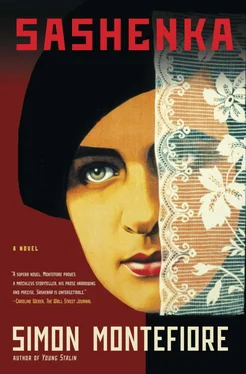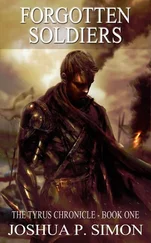“I think so,” he said, pushing back his hair and looking younger suddenly. “Are you a night owl?”
“I feel lazy in the mornings but I come to life at night. All this conspiracy suits me. What about you, Captain? If I’m a night owl, you’re a bat.”
“I live on a knife-edge. Like you and your uncle Mendel. I sleep so little that when I go home to bed, I find I can hardly settle. I get up and read poems. This is what happens to us. We enjoy it so much that it changes us and we can’t do anything else. We conspirators, Sashenka, are like the undead. The vampires. We feed on the blood of the workers, and you feed on the blood of the bloodsuckers themselves who suck the blood of the workers. Quite Darwinian.”
She laughed aloud and sat on the edge of a metal bed, where the mattress was dyed sepia yellow by the hissing lamp.
“We conspirators? There’s no parallel between us, you police pharaoh. We have a scientific program; you’re simply reacting to us. We’ll win in the end. You’ll be finished. You’re digging the grave of the exploiters for us.”
Captain Sagan chuckled. “Yet I see no sign of this. At the moment, your vaunted Party is just a few freaks: the intellectual Mendel Barmakid, a worker named Shlyapnikov, a middle-class boy named Scriabin (Party alias Molotov), a few workers’ circles, some troublemakers at the front. Lenin’s abroad, and the rest are in Siberia. That leaves you, Sashenka. There can’t be more than a thousand experienced Bolsheviks in the whole of Russia. But you’re having a lot of fun, aren’t you? Playing the revolutionary.”
“You’re deluding yourself, Sagan,” she said hotly. “The lines are growing longer, the people getting angrier, hungrier. They want peace and you’re asking them to die for Nicholas the Last, Nicholas the Bloody, the German traitor Alexandra and the pervert Rasputin…”
“Whom you know all about from your mother. Let me try some thoughts on you. Your parents are the very definition of the corruption of the Russian system.”
“Agreed.”
“The aspirations and rights of the workers and peasants are totally ignored by the present system.”
“True.”
“And we know that the peasants need food but they also need rights and representation, and protection from the capitalists. They must have land, and they are desperate for peace. Your father’s dream of a progressive group taking power is too little, too late. We need a real change.”
“Since we agree on everything, why aren’t you a Bolshevik?”
“Because I believe a revolution could come soon.”
“So do I,” said Sashenka.
“No, you don’t. As a Marxist, you know a socialist revolution isn’t yet possible. The Russian proletariat isn’t yet developed. That’s where we differ. According to you, there’ll be no Bolshevik revolution.”
Sashenka sighed. “Our beliefs are so close. It’s a shame we don’t agree on that.”
They were silent for a moment then Sagan changed the subject. “You’ve heard the new Mayakovsky?”
“Can you recite it?”
“Let me try:
To you who lived from orgy to orgy
To you who love only wine and food…
Sashenka took it up:
Why should I give my life for your convenience?
I’d be better off serving pineapple water
To the whore at the bar.
“Beautifully declaimed, Mademoiselle Zeitlin. I salute you!”
“In our country, poetry’s more powerful than howitzers.”
“You’re right. We should use poetry more and the gallows less.”
She watched him closely, keenly aware that both of them were risking their lives in what Mendel called the Superlative Game.
Her hand was on the frozen butt of the Mauser. A few weeks previously, Mendel had arranged for her to be taken out of the city to the birch forests and taught how to shoot: soon she could hit the target more than she missed it. When the Party ordered her to kill Sagan, she would do so.
“What are you carrying?”
The gun at her fingertips made her heart thump. She heard her voice and it did not sound like hers anymore. It was stranger, deeper, surprisingly calm. “Arrest me if you wish. Then you can have some Medusa of a policewoman search me.”
“There’s only one big difference between us, Sashenka. I believe human life is sacred. You believe in terror. Why do your comrades have to kill? I wonder if there is something in their mentality that suits them to this creed? Are they criminals or madmen?”
She stood up again. “Do you have a home to go to, Captain? Are you married?”
“Yes.”
“Children?”
“Not yet.”
“Happy?” Sashenka rubbed her eyes, now weary.
“Are any marriages happy?” he answered.
“I pity you,” she said. “I’ll never marry. Good night.”
“One thing, Zemfira: do you think there’s anywhere I’d rather be than here?”
Sashenka frowned. “That’s no compliment. I suspect most men don’t want to go home. Particularly when they’re vampires like you and me.” We are both armed, she thought almost deliriously. We could both die tonight.
Outside again, Sashenka walked through the streets with a light sleet caressing her face and eyelashes. Sagan was certainly an odd sort of gendarme, she reflected. She was playing along with him, drawing him out. He was older than her, much older, and he had recruited many double agents but his smug confidence in the his gamesmanship was his Achilles heel. Somehow, she’d break him down and deliver him to the Party, like John the Baptist’s head on a platter.
Far away, a train rushed whistling through the night. The black smoke of the factories encircled a silver moon. It was almost dawn: the sky was tinged with pink; the snow a deep purple. The muffled trot of a sleigh approached, and she hailed it.
The bulldog was so cold in her pocket, it burned her fingers.
“The price of oats is up again,” said the coachman, pulling on his tangled beard as they trotted toward the Zeitlin house on Greater Maritime Street.
Zeitlin knocked on the door of Ariadna’s boudoir and entered without waiting for an answer. It was midday but she was still in bed, wearing a silk nightgown with blue bows that revealed the bruised white skin of her shoulders. The room smelled of coffee and tuberose. Leonid had brought her breakfast earlier, and the painted wooden tray with its dirty plates and empty glasses now stood on a stand beside the bed. Luda the maid was laying out the dresses for that day—one for a luncheon, one for calling on friends, one for drinks, then one for a dinner. Four outfits, Zeitlin noted. Were so many dresses really necessary?
“Will this do for tea, Baroness?” Luda appeared from the boudoir holding up a crêpe-de-chine dress. “Oh Baron! Good morning.” She bowed.
“Leave us alone, Luda.”
“Yes, Baron.”
“Sit down, Samuil,” said Ariadna, stretching. She was enjoying letting him see her flesh, he could tell. “What is it? Has the Bourse crashed? That’s all you care about, isn’t it?”
“I’ll stand.” He was conscious that he was clenching his cigar between his teeth.
She stiffened. “What’s happened? You always sit down. Shall I send for coffee?” She reached for the bell but was distracted by the smoothness of her upper arm, which she nuzzled against her lips.
“No, thank you.”
“Please yourself. I had such fun last night. I saw the Elder again. He told me such fascinating things, Samuil. Everyone was talking about the new Premier. Samuil?”
“I want a divorce, Ariadna.” There—he’d said it.
There was a long silence, then Zeitlin saw the words register. She shook her head and raised a hand as if trying to speak.
Читать дальше












